Michael Moore's Sicko
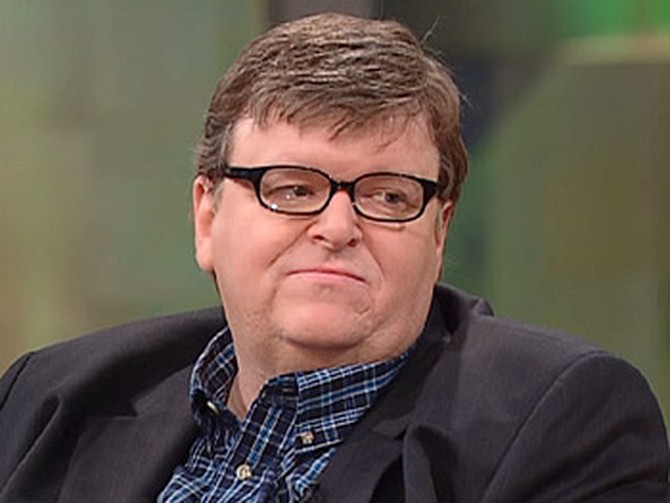
Oscar®-winning filmmaker Michael Moore is known for his controversial movies, including Bowling for Columbine and Fahrenheit 9/11—the highest-grossing documentary of all time. Now, Michael is taking on the trillion-dollar healthcare industry in his film Sicko.
As he navigates this much-debated topic, Michael compares the medical coverage of insured Americans to the care received by residents of other Western nations with "socialized," universal healthcare systems. In countries such as Canada, France and the United Kingdom, patients do not have to pay medical fees out-of-pocket—healthcare is a government service.
According to the film, America's healthcare system is ranked 37th in the world. "When I saw that, [I thought]—I'm an American. I live in the greatest country on earth. I live in the wealthiest country on earth. We're number 37?" Michael says.
Sicko emphasizes that even American patients who have health insurance cannot always afford treatments because their claims can be denied—and Michael wanted to get people talking about it. "I think [there are] 250 million [insured] people thinking that, 'Well, everything's going to be fine,' [but] how many people have actually read their health insurance policy?" Michael says.
As he navigates this much-debated topic, Michael compares the medical coverage of insured Americans to the care received by residents of other Western nations with "socialized," universal healthcare systems. In countries such as Canada, France and the United Kingdom, patients do not have to pay medical fees out-of-pocket—healthcare is a government service.
According to the film, America's healthcare system is ranked 37th in the world. "When I saw that, [I thought]—I'm an American. I live in the greatest country on earth. I live in the wealthiest country on earth. We're number 37?" Michael says.
Sicko emphasizes that even American patients who have health insurance cannot always afford treatments because their claims can be denied—and Michael wanted to get people talking about it. "I think [there are] 250 million [insured] people thinking that, 'Well, everything's going to be fine,' [but] how many people have actually read their health insurance policy?" Michael says.
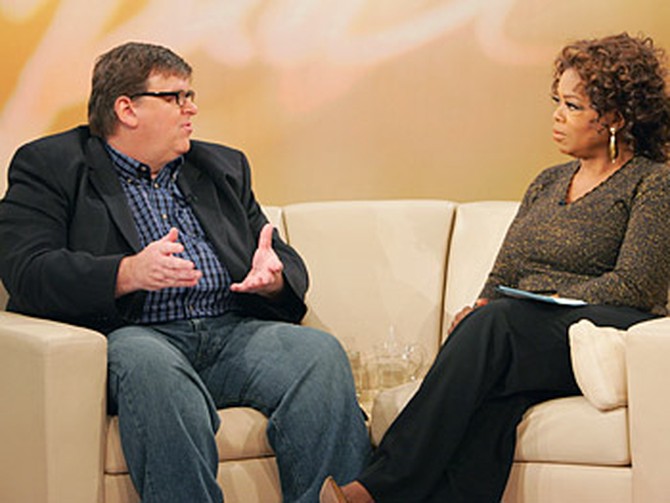
A major point made in Sicko is that many health insurance companies in America are driven by profits. "As they say very clearly in the film, the more care they provide, the less profit they make," Michael says.
In his film, Michael features a clip of Dr. Linda Peeno, a former medical director at a major health insurance corporation. "She's a doctor, and her job was to essentially try and deny as many claims as she could. …," Michael says. "So she blew the whistle on them, testified in front of Congress, and it was a powerful, emotional moment."
While Linda Peeno's testimony was indicative of the practice at some companies, it did not implicate every company. "And let me say a word in their defense," Michael says. "The law demands and requires that a corporation like a health insurance company maximize the profits for the shareholders, and if they don't do that, they're violating the law. … If they are required by law to make a profit, and the only way they can make a profit is by denying claims or cutting people off of their insurance or never taking them on in the first place, then that's not good for us."
One woman Michael talked to was denied a claim for surgery because she had not disclosed a past yeast infection. "They have a whole team of investigators where if a bill hits a certain level—in this case it was just $7,000 for an operation—then they see if there's anything in her past," Michael says. "So the investigator comes back and says, 'Yeah, we went through her medical files and we found that 10 years ago she had a yeast infection. That's good enough. Let's not pay the bill.'"
In his film, Michael features a clip of Dr. Linda Peeno, a former medical director at a major health insurance corporation. "She's a doctor, and her job was to essentially try and deny as many claims as she could. …," Michael says. "So she blew the whistle on them, testified in front of Congress, and it was a powerful, emotional moment."
While Linda Peeno's testimony was indicative of the practice at some companies, it did not implicate every company. "And let me say a word in their defense," Michael says. "The law demands and requires that a corporation like a health insurance company maximize the profits for the shareholders, and if they don't do that, they're violating the law. … If they are required by law to make a profit, and the only way they can make a profit is by denying claims or cutting people off of their insurance or never taking them on in the first place, then that's not good for us."
One woman Michael talked to was denied a claim for surgery because she had not disclosed a past yeast infection. "They have a whole team of investigators where if a bill hits a certain level—in this case it was just $7,000 for an operation—then they see if there's anything in her past," Michael says. "So the investigator comes back and says, 'Yeah, we went through her medical files and we found that 10 years ago she had a yeast infection. That's good enough. Let's not pay the bill.'"
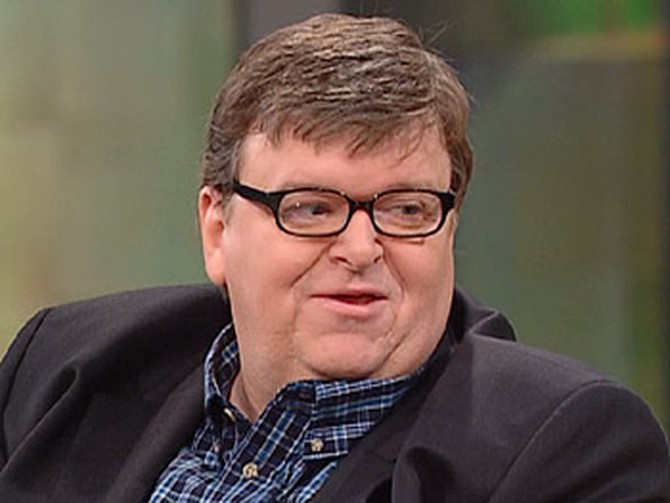
Sicko premiered to standing ovations at the Cannes Film Festival—and Michael says the cheers came from both sides of the political fence. "[Two Americans] came up and they said, 'We're Republicans,' and they held out their hand to shake my hand. And one of them started tearing up and said, 'I just wanted to thank you for making this film,'" Michael says. "And I have to say, at that moment, I just felt like this is the America I want to live in, where we can have our political differences, but on issues like this, we have to come together."
While Michael says political action is necessary to fix the problems in the health insurance industry, he does not want the issue itself to be seen as political. "It's not a partisan issue. It's not Democrat or Republican," Michael says. "When you get sick, you get sick. The illness doesn't care if you're a Democrat or a Republican."
While Michael says political action is necessary to fix the problems in the health insurance industry, he does not want the issue itself to be seen as political. "It's not a partisan issue. It's not Democrat or Republican," Michael says. "When you get sick, you get sick. The illness doesn't care if you're a Democrat or a Republican."
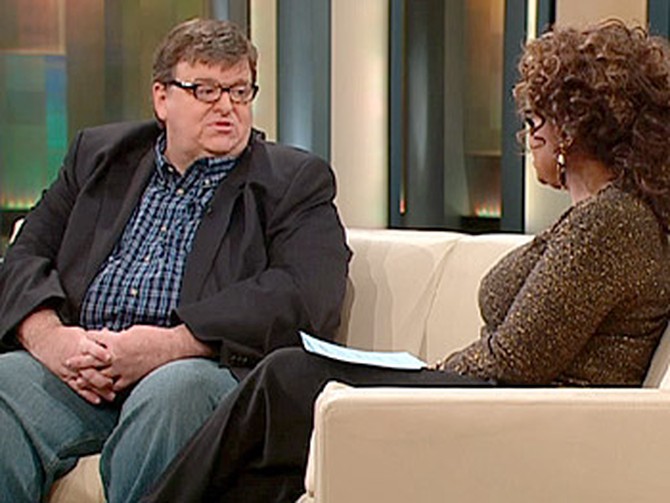
When Michael began producing Sicko, he says the first thing some insurance companies did was refuse to insure the movie! "Every major insurance company turned me down, and I finally found a little insurance agency in Kansas City, Missouri, to actually insure the film," Michael says.
As work began, Michael says some insurance companies prepared employees with instructions of what to do if he came around asking questions. "They sent out memos to their staff—'Do not talk to him.' They had in-service training sessions. 'If he shows up, don't run. Don't flee. Don't put your hand in front of the camera. Get him talking about Detroit sports teams so he'll think about something else,'" Michael says. "One of the pharmaceutical companies set up a Michael Moore hotline. If I were to show up at any of their regional offices, the employees were to call."
As work began, Michael says some insurance companies prepared employees with instructions of what to do if he came around asking questions. "They sent out memos to their staff—'Do not talk to him.' They had in-service training sessions. 'If he shows up, don't run. Don't flee. Don't put your hand in front of the camera. Get him talking about Detroit sports teams so he'll think about something else,'" Michael says. "One of the pharmaceutical companies set up a Michael Moore hotline. If I were to show up at any of their regional offices, the employees were to call."
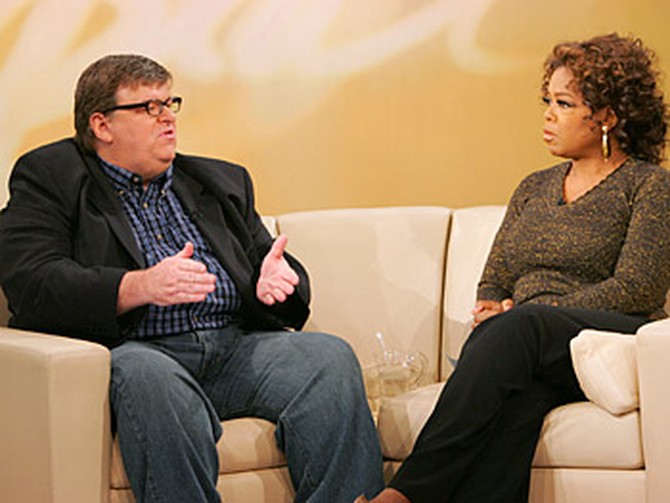
To prepare for the film, Michael posted a message on his website asking people to send him their healthcare stories. The response was overwhelming. "I got over 25,000 letters from people. People who were dying. And I just thought … people are going to die while we're making this film," he says. "Twelve thousand babies this year are going to die because they didn't have health insurance, whereas if they were in Germany or France or another country, they'd live. … And the only reason that they're dying is because they're an American? I just think there's something wrong with that."
So Michael decided to visit three countries with socialized medicine—Canada, Britain and France. The government—not insurance companies—assumes all healthcare costs for its citizens.
And, while some people think that having socialized medicine is un-American, Michael says we already have similar government-funded institutions in this country, such as fire departments, police departments and public schools. "We don't expect the fire department to turn a profit. It would be an appalling thought," Michael says. "And the reason we don't is because it's a life and death issue. Well, healthcare is a life and death issue. And that's why turning a profit…that has to be removed from the system."
To fix the system, Michael says our country needs to start thinking like other Western countries. "They think about the we. Not the me," he says. "They think, 'We're all in the same boat, and we sink or swim together.' And if too many people fall out of the boat, something happens to the boat."
So Michael decided to visit three countries with socialized medicine—Canada, Britain and France. The government—not insurance companies—assumes all healthcare costs for its citizens.
And, while some people think that having socialized medicine is un-American, Michael says we already have similar government-funded institutions in this country, such as fire departments, police departments and public schools. "We don't expect the fire department to turn a profit. It would be an appalling thought," Michael says. "And the reason we don't is because it's a life and death issue. Well, healthcare is a life and death issue. And that's why turning a profit…that has to be removed from the system."
To fix the system, Michael says our country needs to start thinking like other Western countries. "They think about the we. Not the me," he says. "They think, 'We're all in the same boat, and we sink or swim together.' And if too many people fall out of the boat, something happens to the boat."
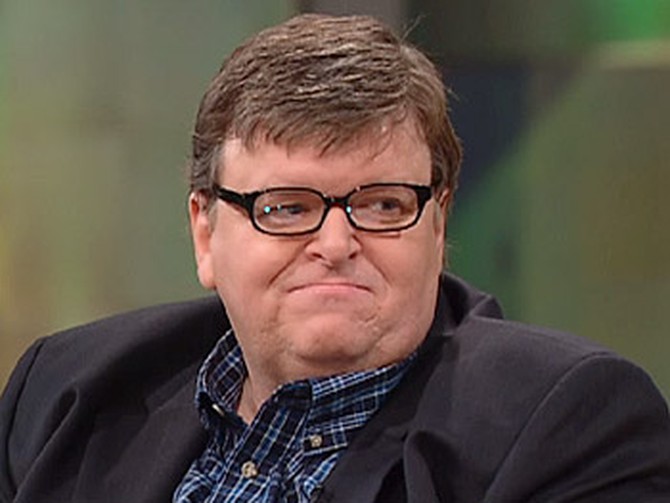
During the making of Sicko, Michael learned about a group of volunteers who sifted through the wreckage at Ground Zero after September 11 to help find victims of the terrorist bombings. Five years later, they all suffer from various ailments after working in the rubble… and they don't have proper healthcare.
In his research, Michael learned that the alleged -alQaeda detainees at the U.S. naval base at Guantanamo Bay receive better medical care than these local heroes. Michael got a boat and sailed to Cuba with some of the volunteers. When Michael and the volunteers were not able to land on the American soil at Gitmo, they went to Cuba. "We said, well, I'm in Cuba now with a bunch of sick people, what am I going to do? Let's see what kind of system they have here. It's free," Michael says. "And they got incredible care and help from the Cuban doctors that we took them to."
Now, Michael is being investigated by the U.S. Treasury Department for possible violations of the trade embargo restricting citizens from traveling to Cuba. However, the law states that journalists may travel to the country. "Well, this is a work of journalism and so it's not illegal, but they've come after me anyway for going down there," he says.
Michael says he doesn't think the government is necessarily upset that he went to Cuba. "It's about [the fact that] I am pointing out to millions of Americans something that's very wrong with our system, that we have 50 million who are not insured. We have 250 million who have insurance and need to worry about [whether] their insurance is going to pay the big bills someday," he says. "We need healthcare guaranteed for every American. Remove the profit from the system."
In his research, Michael learned that the alleged -alQaeda detainees at the U.S. naval base at Guantanamo Bay receive better medical care than these local heroes. Michael got a boat and sailed to Cuba with some of the volunteers. When Michael and the volunteers were not able to land on the American soil at Gitmo, they went to Cuba. "We said, well, I'm in Cuba now with a bunch of sick people, what am I going to do? Let's see what kind of system they have here. It's free," Michael says. "And they got incredible care and help from the Cuban doctors that we took them to."
Now, Michael is being investigated by the U.S. Treasury Department for possible violations of the trade embargo restricting citizens from traveling to Cuba. However, the law states that journalists may travel to the country. "Well, this is a work of journalism and so it's not illegal, but they've come after me anyway for going down there," he says.
Michael says he doesn't think the government is necessarily upset that he went to Cuba. "It's about [the fact that] I am pointing out to millions of Americans something that's very wrong with our system, that we have 50 million who are not insured. We have 250 million who have insurance and need to worry about [whether] their insurance is going to pay the big bills someday," he says. "We need healthcare guaranteed for every American. Remove the profit from the system."
Published 01/01/2006

